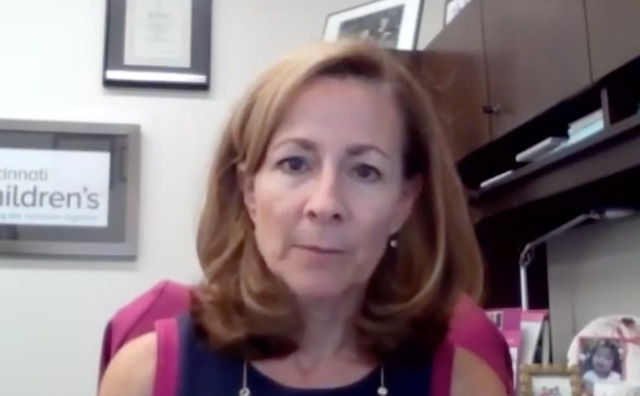
There may be more opportunities for families to gather for this year's winter holidays even as the COVID-19 pandemic continues, but health officials warn that caution still is warranted.
During an Oct. 28 briefing with reporters, Hamilton County Health Commissioner Greg Kesterman said that COVID-19 cases in the county are slowly dropping after sustaining a months-long surge due to the Delta variant, lifting of health restrictions and low vaccination rates. As of Wednesday, Hamilton County had about 5,400 coronavirus cases, which Kesterman said was 1,000 fewer than the prior week.
But Kesterman added that 5,400 cases still was a high number for Hamilton County's small size, and residents should continue to take precautions such as masking and physical distancing. As has been the case for weeks, if not months, every county in Ohio — including Hamilton County — remains at high risk for COVID-19, according to the Centers for Disease Control and Prevention's data tracker.
"I get asked a lot, 'When can we quit wearing masks?' If we're following the CDC recommendations, we need to transition to a county of only moderate spread (instead of high spread)," Kesterman said. "Using the CDC's standard, that would mean we need to get our cases below 50 cases per 100,000 people. So we're heading in the right direction, but we're not quite there yet."
Hamilton County currently is at 138 cases per 100,000 people, Kesterman said — still well above the CDC's standard for abandoning masks.
Another COVID-19 Holiday Season
As it did in 2020, COVID-19 will again affect holiday gatherings, but vaccination, masking and other precautions within individual families may make those events a little safer. Kesterman suggested taking into account each individual's comfort level and health issues.
"Each of us will have to look at our own situations. If you have a healthy family with no underlying risk conditions, your holidays might look very different than a family that's working through treatment of a critical illness and trying to figure out ways to keep everyone safe," Kesterman said. "I would just ask — probably most importantly — that everyone is aware of their surroundings. If you're sick, please don't go to that family gathering."
"Also, be respectful. If a family shows up to your gathering with masks on, realize that's their individual choice and is a tool that is impactful in helping keep families safe," Kesterman added.
Over the last seven days, Hamilton County has had 155 cases of COVID-19, down from 419 cases on Sept. 16 when Delta was still raging. As of Thursday, there were 344 COVID-19 patients within local hospitals, with 114 in the intensive care unit and 91 on ventilators. Kesterman said that hospital staff still are under great strain and that unvaccinated individuals make up the majority of COVID-19 patients, adding that many in the hospital are ages 50-79 instead of the 80+ demographic that had filled facilities last year.
He said about 58% of Hamilton County's total population has been vaccinated from COVID-19, though the county has been trying to hit its local goal of 80% vaccination and the federal goal of 70%. Experts generally have said that communities need a vaccination rate of 70%-90% to reach herd immunity.
"About 90 of 100 people who end up in our hospitals have not been vaccinated, and that's huge," Kesterman said. "That's really another telling story about how successful this vaccine has been at keeping people from developing serious COVID-19 and keeping you out of the hospital."
Kesterman said that while this fourth wave of the pandemic has begun trending downward, healthcare systems likely will continue to be stressed for at least 2-4 more weeks because of how long COVID-19 patients remain under care.
"Sometimes folks are the in intensive care unit for as long as a month receiving treatment, so it takes a long time to clear individuals out of those spaces and make way for new patients," Kesterman said.
COVID-19 Vaccines for Kids
Dr. Patricia Manning-Courtney, chief of staff at Cincinnati Children's Hospital Medical Center, joined the briefing to discuss the recommendation from the U.S. Food and Drug Administration (FDA) advisory committee that Pfizer's COVID-19 vaccine receive emergency use authorization (EUA) for kids ages 5-11 years old. The FDA accepted data from Pfizer showing that its vaccine is safe and 90% effective at preventing COVID-19 for kids in that age group.
Next, the FDA will take or reject that recommendation, and then the CDC will follow with its own recommendations, which officials expect next week.
Currently, Pfizer's vaccine has an EUA for people ages 12 and up as well as full approval for use in people ages 16 and older. Vaccines from Moderna and Johnson & Johnson currently are approved for people ages 18 and up, though both companies are applying for additional approvals.
Cincinnati Children's Hospital was one of five sites in the nation to conduct adult and adolescent COVID-19 vaccine trials in 2020, work that has continued this year for the 5-11 age group. Manning-Courtney said that the number of younger COVID-19 cases admitted to the hospital has dropped recently, but hundreds of children continue to test positive each week.
During an Oct. 25 briefing with reporters, Dr. Robert Frenck, director of the Gamble Vaccine Research Center at Cincinnati Children’s, said that those getting COVID-19 most frequently right now are under 18 years old, which Manning-Courtney echoed Wednesday.
"We've seen the same trends in children as we're seeing in adults. But I would point out that the positivity rate in 5- to 17-year-olds is one of the highest. It's closer to 8%-9% vs. 6% overall, so children are contracting COVID and they're still spreading COVID," Manning-Courtney said.
In September, Manning-Courtney told Kesterman and Hamilton County Commissioner Denise Driehaus that Cincinnati Children's was seeing a significant jump in pediatric COVID-19 cases and hospitalizations. She'd also said that doctors were seeing more children with respiratory issues such as RSV (respiratory syncytial virus) and parainfluenza that normally wouldn’t arise until fall or winter.
Manning-Courtney said that after conducting extensive trials, Cincinnati Children's is ready to begin vaccinating younger children once the FDA and CDC fully sign off on Pfizer's vaccine.
"We've had a front-row seat to the safety and efficacy questions that come up, and we're very excited to share that the side effect profile for children with these vaccines is not any different or any worse than we saw in adults," Manning-Courtney said. "Certainly, children can have some side effects, but as you've probably heard many times, the side effects from COVID are far more serious, severe and dire than any of the side effects from the vaccine."
As Frenck explained in the briefing earlier this week, the vaccine dosage for younger children is about one-third of that for adults (see the full Q&A with Frenck). Kesterman and Manning-Courtney said hospitals, pharmacies and pediatricians within the region have begun preordering Pfizer's vaccine for kids so that they'll be ready to administer it once it receives an EUA. Kesterman added that Hamilton County will be available to conduct vaccination clinics for schools that invite them.
Manning-Courtney said that pediatricians at Cincinnati Children's are looking to normalize COVID-19 vaccine administration, just as they do with other immunizations. But she recognizes that some parents will remain anti-vaccine despite the safety declarations and rigorous trials conducted by scientists and doctors. She said compassionate, patient conversations often are necessary to put their child on a path to good health and protection.
"I have lived and breathed the impact of vaccine hesitancy far before COVID, and we're continuing to see that," Manning-Courtney said. "To be willing to take the risk with your child not just with COVID but with any vaccine-preventable disease seems, in pediatrics, it's unnecessary. These are preventable illnesses."
"For some families, it really requires a trusting relationship with a healthcare provider that they can talk to, not be judged, and not be shamed, but have an open conversation," Manning-Courtney added. "To say let's talk about it, let me tell you what my experience is as a pediatrician seeing thousands of children who have been vaccinated, who are safe, healthy and protected."
Find COVID-19 vaccination or testing sites within Greater Cincinnati.
Sign up for our weekly newsletters to get the latest on the news, things to do and places to eat delivered right to your inbox.





